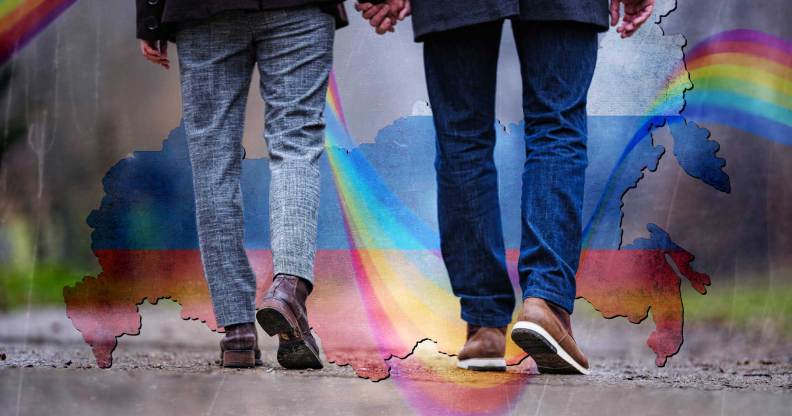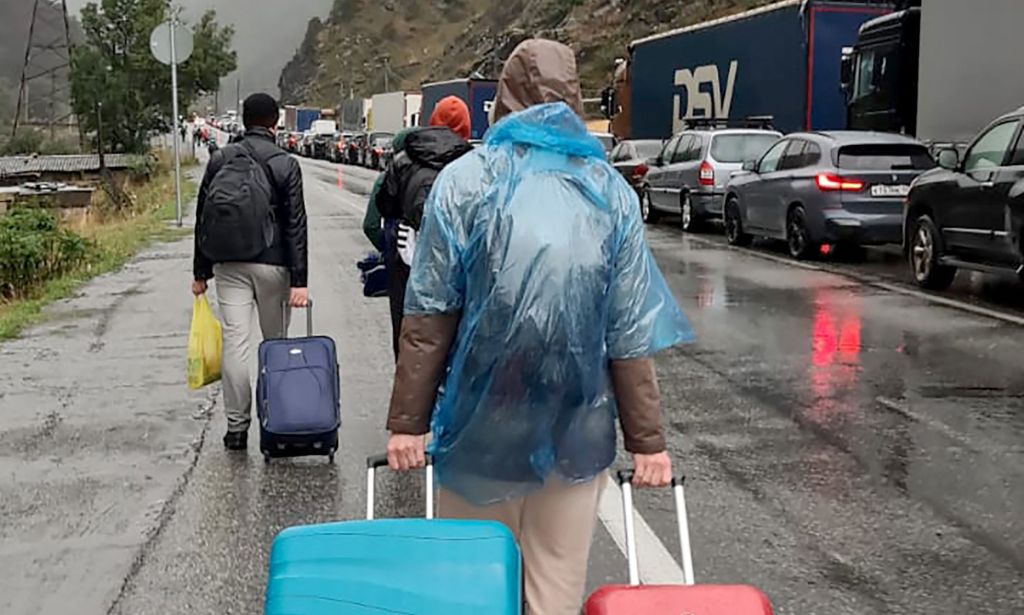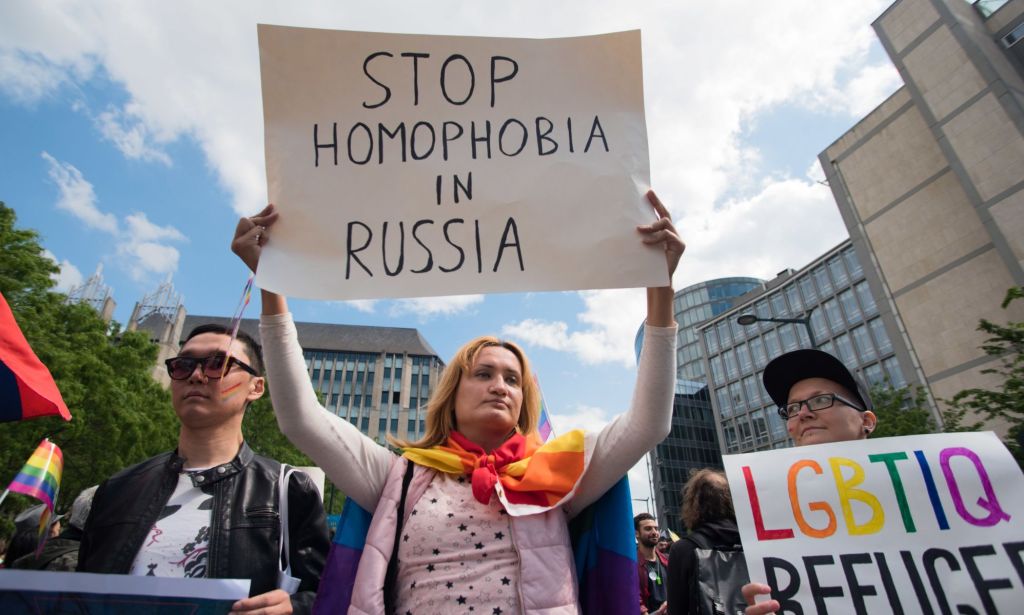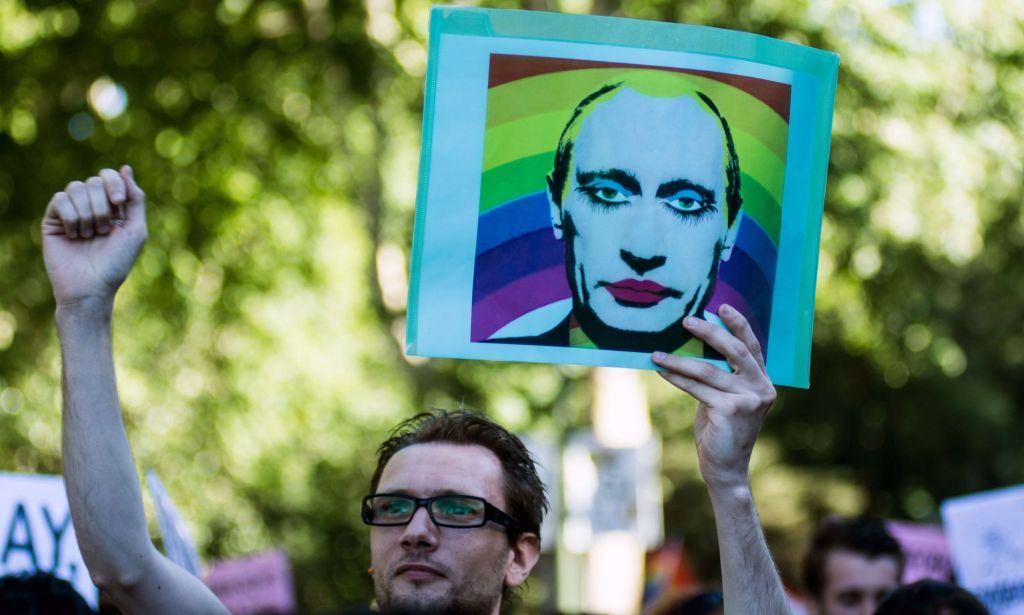‘You left Russia, but Russia never left you’: Queer couple scarred after fleeing anti-LGBTQ+ violence

Russia has issued its first convictions for LGBT ‘extremism’. (Credit: Getty Images)
Max and Sasha are just two of the many LGBTQ+ people who have joined the mass exodus fleeing Russia to avoid violence, discrimination and war.
Now, the queer Russian-Ukrainian couple are left with the scars of living under Vladimir Putin’s repressive regime.
Putin’s obsession with rejecting what he sees as Western “degradation” has led to Russia toughening anti-LGBTQ+ legislation in recent months. At the same time, the Kremlin has clamped down on free speech, human rights and dissent as the war in Ukraine drags on.
Max and Sasha fled Russia this time last year. They joined the hundreds of thousands of people trying to find safety in other countries bordering the huge nation.
They made it to a border with a Baltic country, hitching a ride with a stranger.
When the queer couple got to the crossing, guards confronted them, demanding to know why they were leaving Russia.
Unable to reveal their real reasons, they had “full-on panic attacks just trying to hold back tears” as they waited hours to be let them through, the pair tell PinkNews.
“When we got there and we gave our passports, the guard looked at Sasha’s, and he was like: ‘I can’t see the visa, so what are you doing? What are your plans? What are you thinking? What are you doing there?’” Max, who is Ukrainian, recalls.
“We were like: ‘There are some people waiting for us there’. We were trying to say at least something. You’re completely stunned… we were standing there trying not to cry because they took our passports.
“We were like: ‘What next? What are they doing with our passports? They’re not letting us go’.”

Several countries – including Latvia, Lithuania, Estonia, Poland and Finland – have put in place measures to restrict the entry of Russian citizens, limiting the chances for people to use them as safe havens.
At one point, the border guards let Sasha, who is Russian, through but said that Max couldn’t join him. However, the couple knew they had to stay together so they regrouped in Russia and used “some other ways to cross the border”.
‘The scariest thing was that people were delusional about Russia’
Eventually, they made it into one of the Baltic states and began the process of applying for asylum. But they encountered difficulties with access to resources because of their differing citizenships, given the ongoing war.
Max feels he has a “lot of privilege as a Ukrainian” because he can travel, and it’s “easier” to find a job. Sadly, he can’t share that same level of support with Sasha because the pair aren’t married yet.

The queer couple’s asylum application was initially denied because the person reviewing it argued that it’s merely “hard” for gay people in Russia – refusing to recognise the very real abuse LGBTQ+ people face.
“The arguments were: ‘It’s hard for gay people in Russia, but you did go to work. You did finish at school’,” Max explains.
“We were basically going around the streets, pretending we are someone who we are not. No matter how [hard] we try, people always figure everything out.
“We were standing near a subway station and hearing a guy talk to his wife like: ‘Oh my God, you won’t believe it. I’m standing next to the most disgusting f*****s. Come save me. They’re gonna rape me right now’. People don’t understand that it’s not possible to get any proper help.
“At [one] point, we were shot at. There were four guys passing us by in a car. They stopped to ask if we’re f*****s, and we said ‘no’. They said: ‘We saw you guys kiss’. We weren’t kissing.
“When we were talking about this in our [asylum] interview, they were like: ‘Why didn’t you go to the police?’ It’s pointless, you’ll leave the police station feeling worse.”
Sasha and Max, who have since been granted asylum after appealing the first ruling, say that people react with shock when they discover the true level of discrimination and violence LGBTQ+ people face in Russia.
“I think the scariest thing was, when we arrived, that people were delusional about Russia,” Sasha says. “They don’t know anything, what happens there and how it happens, which also affected our case.
“They don’t understand that, if you go to the police, you can be assaulted or even killed there, and no one will know. People have no idea what it is like… I was so scared after all that, that while being [in the country that last year], I wouldn’t go out of my house because I was so scared of people, men specifically.”
Anti-LGBTQ+ ideology has been a central axis of political propaganda in Russia over the past decade
In July, Moscow approved a law that prohibits gender-affirming care for trans people, nullifies marriages where at least one partner has transitioned and makes it illegal for transgender people to adopt or foster children.
This came hard on the heels of legislation expanding Russia’s “LGBTQ+ propaganda law”, which prevents any positive or neutral queer representation in public spaces and pop culture.
There’s also been a surge in anti-LGBTQ+ sentiment.
A gay university student was expelled after posting videos of himself in makeup online, a queer YouTuber was arrested after uploading videos of himself with his partner, and a trans woman said she’s “scared s**tless” as Putin paints transgender people as enemies of the state.
Sasha and Max still feel the impact of the Russia’s oppressive anti-LGBTQ+ laws, which have led to hate and violence on the streets. As they put it: “You left Russia, but Russia never left you.
“It’s been a year, and when we got the asylum status approved, it was a relief, but I did not feel safe,” Sasha says. “It’s still hard for me to get out of the house. I’m still wearing a hat outside when I dye my hair.
“Yes, I understand that I don’t live in danger any more. I’m not in Russia. A rational part of me knows I’m not there, and it’s not as scary as I think it is outside [and] I can express myself with clothing more.”

Anna-Maria Tesfaye, the co-founder of LGBTQ+ not-for-profit organisation Queer Svit, says many LGBTQ+ people think they can “leave this bulls**t behind” when they flee Russia, but they realise they are still “mentally” trapped in the country’s politics of terror.
“You finally have the ability to think because you’re not in Russia any more,” she says.
“You don’t need to do anything, then it hits you. You understand that maybe you’re out of Russia, but you’re in Russia mentally. A lot of people understand that it’s probably post-traumatic stress disorder.”
Max and Sasha say they still “scan every corner [and] every street” for “scary-looking people” and the police because of their Russian experiences.
The pair are feeling a “little more freedom” in their new home, but it’s still difficult to live fully in the moment given the hate they endured.
How did this story make you feel?

